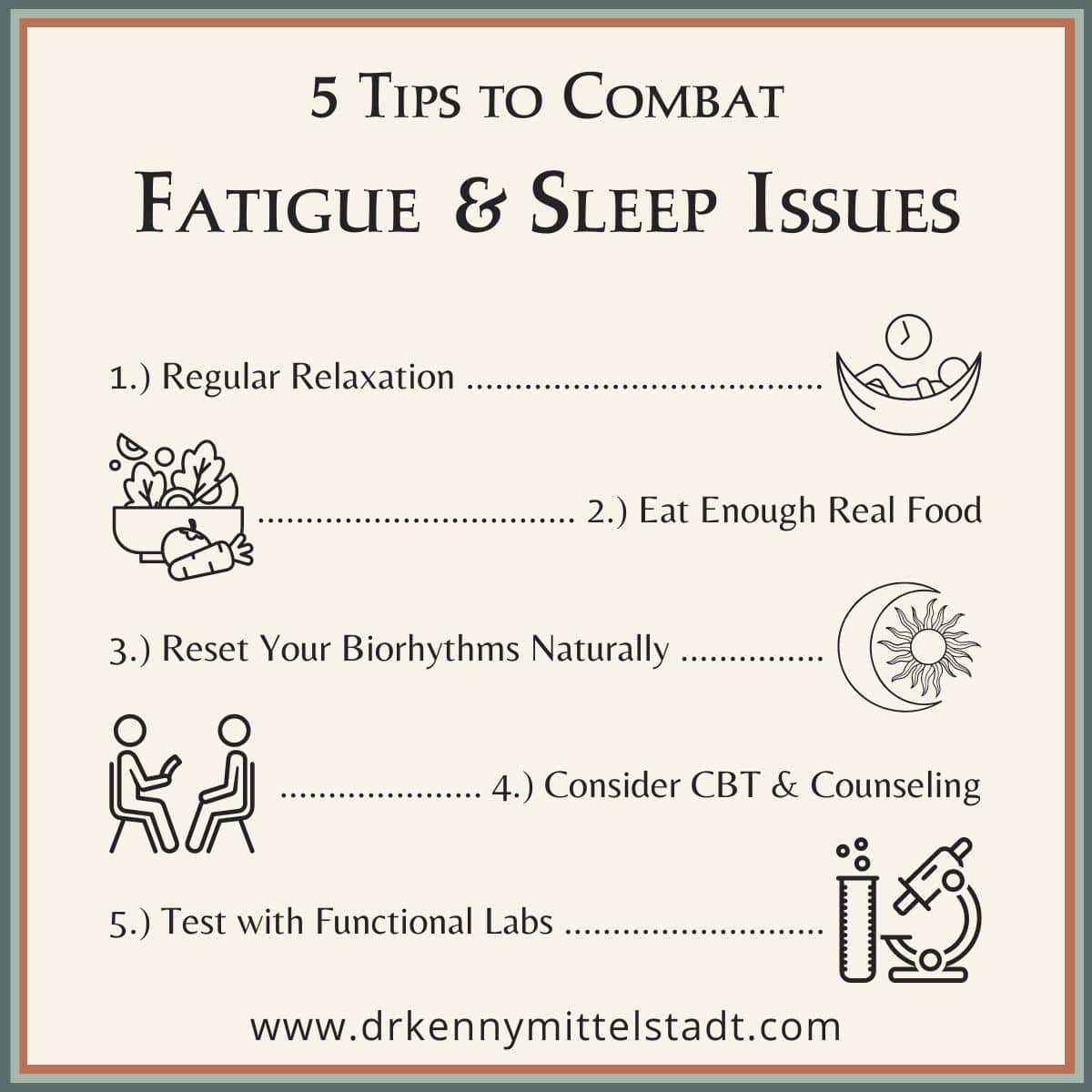It may seem counterintuitive, right? You may be asking yourself, “why do I feel tired all day, but I can’t fall asleep easily at night?” How frustrating and backwards. This is what we call feeling “tired but wired.”
Don’t fear, you’re not alone. There is hope despite how constraining and circular this situation can feel.
In this post, we’ll start by briefly mentioning some of the underlying reasons for this relentless pairing of low energy and sleep issues. Then, I’ll present you with 5 tips that you can start to use today to break up this experience.
Whether you are experiencing fatigue and low energy (tired) or difficulty falling or staying asleep (wired), or both, this post is a starting place for you!
Having adequate energy and restful sleep are absolutely foundational to our quality of life!
WHY do you feel tired and wired?
Arguably, it is part of the human experience to have a day or two every now and then where we feel tired. Or we might have a tough night or two where restful sleep is elusive. But what is happening when your low energy or sleep issues become more regular, even constant?
When regular low energy or sleep issues arise, I start to consider some of the sneaky, often gradual or insidious processes that might be lying underneath.
Our ability to produce energy and sleep restfully rely on a complex and coordinated dance of many of our hormones and nervous system pathways. There is a system that plays a role in these complex processes known as our HPA Axis.
In a nutshell, this is one of key systems that can become uncoordinated and eventually lead to that tired and wired feeling. Chronic stress, environmental toxins, illness, undernutrition – the list goes on as to the many ways that this system can become thrown off.
You may have heard of the term “biorhythm.” This is a general term that is used to describe the coordinated fluctuations hormones and nervous system signals that create our natural body functions. Both sleep and energy production are a result of some biorhythmic processes that are coordinated by the HPA-Axis.
8 Common Causes of Feeling “Tired but Wired”
- Chronic Stress Response – Long-term and/or high intensity stress can affect our “neuroendocrine” (nervous system and hormonal) set points and deplete the resources over time. Stress comes in many forms including mental, emotional, financial, environmental, social, personal, etc.)
- Overstimulation – Being over-stimulated can also overwhelm the system and deplete our resources. Consider caffeine, artificial light, email and phone notifications, overworking, etc.
- Some Medications – Some medications can directly affect this system and disrupt our natural biorhythms. Research shows that corticosteroids used to help with inflammation can cause insomnia and disrupt the HPA Axis. Antidepressants are another class of medication that may cause insomnia.
- Sleep Deprivation – Short bursts of not being able to sleep can disrupt longer patterns of sleep and our natural rhythms
- Overexercise & Exertion – Exercising too much can deplete our resources and ability to fully recover
- Undernutrition – Nutrition is the basis for all the building blocks that make us human. From the proteins to create enzymes, body tissues, and fats to create our cell membranes and steroid hormones, everything comes back to our fuel – food.
- Inadequate Hormone – Underlying hormone conditions that cause either excessive or deficient hormone production or sensitivity can affect our global hormone and nervous system. Everything is connected.
- Psychosocial Factors – Anxiety, relationship stress, sense of purpose, and many aspects of our mental health and well being can affect our hormonal and nervous system set points.
This is not an exhaustive list, but summarizes some of the most common reasons for feeling tired but wired. Each of these, and in any combination, has the potential to skew our normal “set points.”
Let’s move on to 5 actionable tips to help you overcome being “tired but wired.”
5 Actionable Tips to Overcoming that “Tired but Wired” Feeling
Now to correct an imbalanced situation there are two overall approaches. One is to remove or adjust the imbalancing factors (consider the 8 common causes above) to promote balance. And the other is to strengthen the restorative factors that combat the above causes.

Tip #1 – Incorporate Regular Relaxation that Resonates with You
Relaxation is necessary, not just a reward! In a society that prioritizes ultimate productivity and “the grind” it can feel uncomfortable to slow down. Relaxation is an important part of our self-regulation and can be pivotal to maintaining a balance nervous system and hormones!
What’s your favorite way to relax?
When feeling “tired but wired”, it can feel quite unnatural to relax. My advice? Treat your relaxation time like your next doctor’s visit and schedule it in. Even 90 seconds of mindfulness and breathing can make a huge difference! Check out this 90-Second Reboot!
Tip #2 – Eat Enough Real Food
Food is fuel. Eating a balanced amount of high quality protein, complex carbohydrates, and quality fats is key to providing your body with the building blocks it needs to thrive. Vitamins and minerals also play a key role in overseeing the incredible number of chemical reactions happening in our bodies every second of the day!
Fasting and intermittent fasting are all the rage right now, but it may not be right for someone who is stuck in “survival mode” already in regards to their nervous system and hormones.
Consult with your functional medicine practitioner or functional nutritionist if you’re not sure where to start!
Tip #3 – Reset Your Biorhythms with Regular, Natural Queues
Natural sunlight has a great potential to help us sync up. Not only does the sun help to activate vitamin D which guides all kinds of neurohormonal processes, but it can signal our bodies to restore a normal sleep schedule.
Try starting with avoiding artificial light when the sun goes down – yes this means TV screens, computer screens, and phone screens. You might also try to step outside during the sunrise and take some deep breathes. Reconnect your rhythms with the rhythms of the earth – quite profound if you think about it.
If there’s something I’ve come to appreciate in this lifetime, it’s how unique and personal each of our own experiences of life truly is. Every patient of mine arrives through their own lens and individual story.
Cognitive Behavioral Therapy and other counseling approaches can be monumental tools in this journey to self-love, self-knowing, and connecting to the deepest parts of our center. Whether you’re experiencing the anxiety that comes with your children growing up and individuating or you’re about to move away from your hometown for the first time, each of our experiences of change and adaptation are unique.
This translates immediately to the way our bodies also process change and adaptation to things outside us as well as our inner dialogue and thoughts.
Healthcare is quickly widening the emphasis placed on the mental and emotional health as part of overall health, not just physical health. One of the foundational tenets of functional medicine is these aspects of our health are all delicately intertwined.
Tip #5 – Test Your HPA Axis with Functional Medicine Labs
Finally, what should you consider if you want insight into the inner workings of your biorhythms? A great place to start with with functional labs such as a salivary cortisol test. This test is helpful when trying to gain more insight into your individual experience of the rhythm of your stress hormone, cortisol.
It’s a simple, at-home test that measures salivary cortisol at specific times of the day and night. When compared to normal, natural ranges, this test can reveal some key levers that might dramatically influence how you address your symptoms such as the “tired and wired” experience.
Consult with a functional medicine practitioner if you’re interested in checking this first step to resetting your HPA-Axis, and thus your resilience to stress, sleep, and energy from the inside out!
The best part is that these functional labs reveal information that is unique to you and your individual functioning.
Conclusion
I hope you gained some powerful insights throughout this post. If you’re suffering from poor sleep and low energy in any combination, this might be a great place to start.
Try incorporating some of these tips, from prioritizing regular relaxation to syncing your daily routines with sunlight. I hope they help, and as always, feel free to reach out anytime on my Instagram and share this post with a friend or loved one!
If you’re new to the functional medicine world, check out the first part of my blog series on functional medicine vs. conventional medicine to learn more.
Remember, “health is contagious, share the love.”
About the Author
Dr. Kenny Mittelstadt is a root-cause health detective and functional medicine practitioner practicing in Texas, California, and Florida. Trained through the Institute for Functional Medicine with dual doctorates earned at highest honors from Southern California University of Health Sciences, he helps patients solve complex health issues naturally using advanced functional lab testing and personalized holistic care instead of conventional medications.

